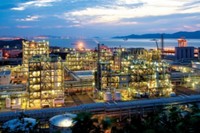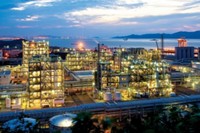Advertisement
Grab your lab coat. Let's get started
Welcome!
Welcome!
Create an account below to get 6 C&EN articles per month, receive newsletters and more - all free.
It seems this is your first time logging in online. Please enter the following information to continue.
As an ACS member you automatically get access to this site. All we need is few more details to create your reading experience.
Not you? Sign in with a different account.
Not you? Sign in with a different account.
ERROR 1
ERROR 1
ERROR 2
ERROR 2
ERROR 2
ERROR 2
ERROR 2
Password and Confirm password must match.
If you have an ACS member number, please enter it here so we can link this account to your membership. (optional)
ERROR 2
ACS values your privacy. By submitting your information, you are gaining access to C&EN and subscribing to our weekly newsletter. We use the information you provide to make your reading experience better, and we will never sell your data to third party members.
Petrochemicals
Covestro spending $1.7 billion on new isocyanate plant in Texas
Massive expansion is meant to address a tightening market for the polyurethane raw material
by Alexander H. Tullo
October 11, 2018
| A version of this story appeared in
Volume 96, Issue 41

In its largest ever investment, Germany’s Covestro will spend $1.7 billion to build a new methylene diphenyl diisocyanate (MDI) plant in Baytown, Texas.
Covestro, the former materials science division of Bayer, expects that the plant will come on-line with 500,000 metric tons of annual capacity by 2024. As part of the effort, the company will also build capacity for MDI raw materials such as aniline. It will close an older 90,000-metric-ton-per-year MDI plant at the site.
“This is a significant investment, and it takes a lot of time and energy to do a thorough analysis” of the project’s value, says Christine Bryant, senior vice president for polyurethanes in North America for Covestro.
The market demand for MDI, which is reacted with polyols to make polyurethane foams and other materials, is about 7 million metric tons per year globally and growing at a healthy 5% clip. “You basically need a world-scale plant every year,” says Craig Caputo, vice president of polyurethanes regional product management for Covestro.
Caputo sees the market becoming increasingly tight over the coming few years. “There will be a period of time where capacity being added will not keep up with demand,” he says.
In addition to the Texas expansion, the company is doubling capacity at its MDI plant in Brunsbüttel, Germany, to 400,000 metric tons per year in 2019. The company is also expanding capacity at its small unit in Tarragona, Spain, by 30% in 2022. Covestro had slated the Spanish plant for closure, until it reversed itself in 2017 because of the strength of the MDI market and because it secured a chlorine supply.
In the U.S., competitor BASF earlier this year began construction on a 300,000-metric-ton expansion of its Geismar, La., MDI plant—doubling capacity there. Chinese giant Wanhua Chemical has been mulling the construction of a $1.1 billion complex in Louisiana.
“There is definitely a need for new product,” says Regina Sousa, a polyurethane consultant with Tecnon OrbiChem. For the past two years, the market has seen its share of production outages, leading to short supplies, she adds. Prices have been trending upward during this time.




Join the conversation
Contact the reporter
Submit a Letter to the Editor for publication
Engage with us on Twitter